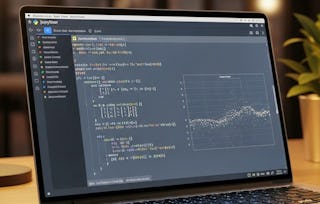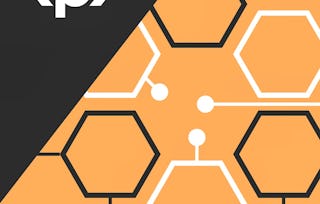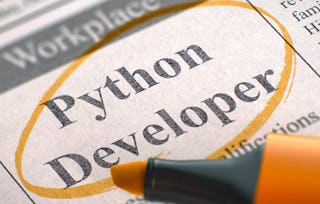This course introduces the dictionary data structure and user-defined functions. You’ll learn about local and global variables, optional and keyword parameter-passing, named functions and lambda expressions. You’ll also learn about Python’s sorted function and how to control the order in which it sorts by passing in another function as an input. For your final project, you’ll read in simulated social media data from a file, compute sentiment scores, and write out .csv files. It covers chapters 10-16 of the textbook “Fundamentals of Python Programming,” which is the accompanying text (optional and free) for this course.

Python Functions, Files, and Dictionaries

Python Functions, Files, and Dictionaries
This course is part of Python 3 Programming Specialization


Instructors: Paul Resnick
152,159 already enrolled
Included with
5,437 reviews
What you'll learn
Explore the dictionary data structure and user-defined functions in Python.
Understand concepts like local and global variables, parameter-passing techniques, named functions, and lambda expressions.
Apply Python's sorted function and control sorting order with custom functions.
Create a final project involving social media data analysis and CSV file manipulation.
Skills you'll gain
Details to know

Add to your LinkedIn profile
See how employees at top companies are mastering in-demand skills

Build your subject-matter expertise
- Learn new concepts from industry experts
- Gain a foundational understanding of a subject or tool
- Develop job-relevant skills with hands-on projects
- Earn a shareable career certificate

There are 5 modules in this course
In week one the video lectures and the Runestone textbook will introduce you to the idea of incorporating files into your programs as an additional source of data. You will learn how to read from a file, write to a file, and how to work with the .csv data format.
What's included
20 videos3 readings1 programming assignment13 app items3 ungraded labs
In week two the video lectures and the Runestone textbook will focus on a new data type, dictionaries. You will be introduced to the mechanics of dictionaries and then get practice using them in accumulation patterns, both to build a dictionary using the pattern as well as find the best, or worst, result using the pattern.
What's included
15 videos2 programming assignments10 app items1 ungraded lab
In week three you will be introduced to the construction of functions. Up to this point, you have used functions in the programs before, but have not had a chance to write your own functions, including how to define a function, how to incorporate parameters, how to return data from a function, the local or global scope of variables, and potential side effects that could occur from function execution. Finally, we look at tuples more in depth, and how automatic packing and unpacking of tuples can be used in functions and in for loops.
What's included
19 videos2 programming assignments21 app items2 ungraded labs
In week four the video lectures and the Runestone textbook will outline a more advanced iteration mechanism, the while loop. You will be introduced to using it when getting feedback from users, as well as applying it to the turtle module to draw images. Additionally, you will also be exposed to more advanced function concepts such as the idea of parameters being optional, not required, and anonymous functions using lambda.
What's included
14 videos2 programming assignments13 app items3 ungraded labs
In week five the videos and Runestone textbook will detail how to sort python objects - both the basics and more advanced forms of sorting for dictionaries and how to break a tie (if that occurs). The final course assessment will be a project that asks you to read fake, auto-generated data from a social media site to analyze social media post sentiments. You will submit a csv file as well as images of graphs that demonstrate your findings.
What's included
16 videos3 readings2 programming assignments1 peer review7 app items1 ungraded lab
Earn a career certificate
Add this credential to your LinkedIn profile, resume, or CV. Share it on social media and in your performance review.
Instructors


Offered by
Explore more from Software Development
 Status: Free Trial
Status: Free Trial Status: Free Trial
Status: Free Trial Status: Free Trial
Status: Free TrialRice University
 Status: Free Trial
Status: Free Trial
Why people choose Coursera for their career

Felipe M.

Jennifer J.

Larry W.

Chaitanya A.
Learner reviews
- 5 stars
87.16%
- 4 stars
11.16%
- 3 stars
1.19%
- 2 stars
0.16%
- 1 star
0.31%
Showing 3 of 5437
Reviewed on Nov 6, 2019
The course met all my expectations and went beyond. The instructors' explanations were easy to understand and the innovative method of having a digital textbook was undoubtedly convenient.
Reviewed on Apr 7, 2020
A great course for learner not only to gain some basic python skills, but also learn to do some research whenever there are additional knowledge needed for completing exercises or project.
Reviewed on Nov 3, 2020
no doubt this is the best course n Coursera , but you have to raise the difficulty level of the assessments so that we can execute the project even more faster without cracking our heads.

Open new doors with Coursera Plus
Unlimited access to 10,000+ world-class courses, hands-on projects, and job-ready certificate programs - all included in your subscription
Advance your career with an online degree
Earn a degree from world-class universities - 100% online
Join over 3,400 global companies that choose Coursera for Business
Upskill your employees to excel in the digital economy
Frequently asked questions
To access the course materials, assignments and to earn a Certificate, you will need to purchase the Certificate experience when you enroll in a course. You can try a Free Trial instead, or apply for Financial Aid. The course may offer 'Full Course, No Certificate' instead. This option lets you see all course materials, submit required assessments, and get a final grade. This also means that you will not be able to purchase a Certificate experience.
When you enroll in the course, you get access to all of the courses in the Specialization, and you earn a certificate when you complete the work. Your electronic Certificate will be added to your Accomplishments page - from there, you can print your Certificate or add it to your LinkedIn profile.
Yes. In select learning programs, you can apply for financial aid or a scholarship if you can’t afford the enrollment fee. If fin aid or scholarship is available for your learning program selection, you’ll find a link to apply on the description page.
More questions
Financial aid available,
¹ Some assignments in this course are AI-graded. For these assignments, your data will be used in accordance with Coursera's Privacy Notice.

